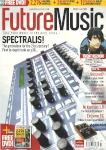
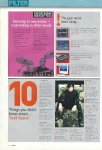
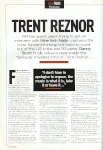

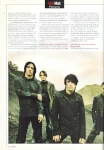
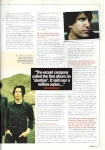
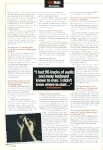
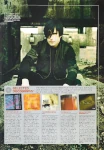
Trent Reznor
FM has spent years trying to get an interview with Nine Inch Nails - perhaps the most forward-thinking cult band to come out of the US in the last 20 years. Danny Scott finally takes a peek inside the famously troubled mind of Trent Reznor...
-By Danny Scott
For example, at NIN's recent Astoria gigs in London - their first UK shows since Glastonbury 2000, they coincided with the unveiling of the band's fifth album, With Teeth - T1 looked like a pissed-off extra from Hellboy, thrashing the crap out of his poor guitar and continually colliding with other members of his band. Anyone who saw NIN's first ever UK show at the same venue back in the early-90s may even remember that Reznor had developed a nasty habit of drop-kicking his then guitarist, Richard Patrick - who went on to form Filter - into the mosh pit. As for his poor keyboards! FM is still haunted by nightmares of a heavily-weighted mic stand being swung - sledgehammer-style - into any bit of gear that happened to be lying around. Keys, buttons, knobs and mother boards all exploded around the stage as T1 went on the rampage. The songs on NIN's debut album, 1989's Pretty Hate Machine, only seemed to highlight the frontman's dabble with his dark side. "Head like a hole/ Black as your soul/ I'd rather die than give you control," he howled on the single Head Like A Hole. Five years later, the cheerily-titled The Downward SpiralHurt - as covered beautifully by the late Johnny Cash. We've all heard that opening couplet: "I hurt myself today/ To see if I still feel." Reznor even decided to record the album in the infamous LA house where Sharon Tate was murdered by the even more infamous Charles Manson and his fucked-up followers. In case we didn't get the point, T1 built his next studio in an old funeral home in New Orleans. It seemed like he did, indeed, have a head like a hole... black as the darkest soul you could think of. But if that is the case, who's this bloke sitting in the slick and minimalist West End hotel? Turning down the chance of a second coffee of the morning and bounding up to FM with the sprightly stride of a man who obviously thinks that promotional interviews are the best thing since sliced loops in ReCycle. "This is the studio interview, right?" asks the happy bloke, pumping FM's hand with a shake that would scare most motivational speakers. Is this really the same bloke that once bawled, "I wanna fuck you like an animal"? C'mon... he's not even wearing black. And where's the eye-liner. Where are the drugs? Where the hell is the misery? Say hello to T2. The other Trent Reznor. The one that has the job of trying to explain what T1 gets up to. The one that has to talk about all those depressions and answer endless questions about songs titles like Terrible Lie, March Of The Pigs and the jaunty sing-along that is The Day The World Went Away. Most of all, T2 gets asked, `How did you come up with the name, Nine Inch Nails?' - usually by European metal magazine journalists. But even when he is faced with this and a endless string of pointless questions from a Swiss hack - as he was when FM was being ushered into the hotel suite - T2 is polite, considerate and attentive. Frankly, if you met this Trent Reznor down the pub, you'd probably think he was a really nice bloke. Reznor seems to enjoy presenting people with this psychological conundrum. Which is the real one - T1 or T2? "I guess it's the same old story," he says, stretching out on the sofa. "People listen to a Nine Inch Nails album and they think they know all about me. They say, `Listen to this song. Trent's so fucked up'. Yes, there are a lot of emotions that go into my music. A lot of dark emotions. But there is a lot more to my life than that. I don't walk around with a permanent frown. I enjoy stuff. I have fun." Go on. Admit it. That's not something you expected to hear from Trent Reznor, is it? Enjoy! Fun! People really shouldn't be so surprised. That struggle between light and shade has been woven into Reznor's music from those earliest releases. Scratch beneath the surface of seemingly dour clumps of sound like Head Like A Hole or Broken or the latest single The Hand That Feeds and you'll find a rich vein of elegant melodies and radio-friendly hooks. It's something that has caused Reznor no end of hassle. He's been called a sell out. He's been ridiculed for having hits. He's been despised for his multi-platinum success. "I'm not trying to defend myself here, but it is fucking hard to write a good pop song," he says. Perhaps a touch defensively. "It's not a calculated thing. I didn't sit down and think, 'OK, let's sell a million records.' This is how my music comes out. It's what's inside me. I like to write songs that have something for people to grasp on to. I appreciate the power of a good hook. "People have said some shit about my songs and, at times, that has made me re-evaluate what I'm doing. I've looked at Nine Inch Nails and I've said, 'Am I making silly pop songs? Is this cool? Am I cool?' Y'know, all those stupid, pointless question you ask yourself. But I came to the conclusion that I don't have to apologise to anyone. The music is what it is. And I am what I am. Take it or leave it. It's your choice." Before we make up our minds, FM has got an hour with the man some people accuse of taking industrial music into the mainstream. The man some people accuse of inventing New Metal. The man who allegedly discovered Marilyn Manson. The man whose success apparently forced Axl Rose to sack the rest of Guns N' Roses and embark on a new electronic direction. Hmm...let's hear what Trent Reznor's got to say, eh? I'd always been into computers because I was good at math, but the idea of actual 'electronic' music didn't really hit me till I bought a Moog Prodigy - that was when I was about 16 or 17. That thing just blew my mind. Initially, I thought I'd combine the math and the music. Maybe design synths or consoles or something like that. But, eventually, it dawned on me that, even though I was very good at calculus, I didn't actually like doing it. So, I decided to do something I did like. Music. I remember getting a Commodore 64 with the Sequential Circuits cartridge sequencer slotted into the back - it didn't even have quantize. And then I got a Linn 9000. Man, have you ever tried to program one of those things? But I was starting to build up my rig. I think the next thing I bought was a Prophet VS from the keyboard shop I worked at. I got it for cost, but the box was too big to fit in my car, so I threw the box away and put the keyboard in my car and drove off. Unfortunately, I stopped off at a friend's house on the way home and forgot that I'd left my window down. It started raining and the Prophet got soaked. I hadn't even got it home. I dried it out the next day, but something must have happened to the VCA, because the sound started getting progressively weirder and weirder. I kinda ended up liking it that way. I've used that keyboard on every album since... and every album it gets a little bit more fucked up. By the time I got my record deal with TVT to release that first album, I was the definition of ready-to-go. Man, I was prepared. I had spent days and weeks and months on these songs. Everything was there. All the drums programmed. All I had to do was add some guitars and redo the vocals. The deal didn't give me much money, but I did persuade them to give me enough to come over to the UK and work with John Fryer [who produced the likes of Depeche Mode, Cocteau Twins and had a long relationship with the 4AD label]. I really admired Fryer's work, but we didn't hit it off. He was into experimenting in the studio, but I'd already experimented with these songs about 3,000 times. They were as finished as they were ever going to be. My money I'd got from TVT gave me about a month in the UK, which was about two days to record and mix each song. I just wanted to get the album finished. He helped to program a few more drums and livened things up a bit, but what actually came out was still pretty much me and my original demos. That whole first album was me in the studio, just messing around. Trying to find an identity. Trying to find out how I wanted to sound. When I did start putting the band together and we started playing some of the songs from Pretty Hate Machine, I think it really changed my mind about what I wanted to do in the studio. Out on tour, the songs sounded like these giant, ferocious... things. But when I put the album on, I thought, 'This is weak. This is light.' When I went back in to the studio to do Broken and The Downward Spiral, I think it was my attempt to recreate the aggression and the power of playing live. And, looking back, I think it was a bit of knee-jerk reaction to all those people who said Nine Inch Nails was pop music. At the time, that hurt me. My heroes didn't play pop music. My heroes were 242, Skinny Puppy, Ministry... the power of heavy metal without the schlock and the leather trousers. My world was Studio Vision. Their very first four-track digital audio package and a bit of Digidesign hardware. These days, it doesn't seem like much, but this gave me a whole new way of recording. I started to think about loops of audio. I could find the right drum loop and then I could jam over the top of that with bass or synth or guitar for 20 minutes and then go back to find the best bits. To me, it was the most inspiring thing that had ever happened. I loved working on my own and this allowed me complete freedom. There were no plug-ins or anything like that, but I did have a programme called Turbosynth - which was kind of a wave-shaper-type-thing. You could record something on Studio Vision, export it into Turbosynth and export it back out to Studio Vision. All the guitars on Broken were done like that. Which I guess is why they all sound so crazy. I also had the money to put all that equipment into my first proper studio, which meant that I was able to spend more time on the songs. In fact, what did happen was that the whole demo, writing and recording process all melted into one. I would go into the studio, work on ideas, and those ideas would turn into finished songs. There was no distinction between the demo process and the recording process as there had been before. With the next album, Fragile, I just took the whole recording process one step further. It was a no-holds-barred version of what I had for Downward Spiral. I had 96 tracks of audio and every keyboard and sampler known to man. I didn't know where to start. But I began to think, 'Where do you go from here?' Because the equipment was getting better and getting cheaper, everyone was suddenly working on the same computer-based systems. Everyone could chop up the sound and everyone could fix things with a plug-in. It was easy to do things right and everyone was doing things right. The music all began to sound the same. It was only then that it dawned on me that I was actually lucky. I was lucky that I'd had to go through all that shit. I was able to think back to a time when there were mistakes in the music. When everything wasn't perfect. If you've only been making music in the last couple of years, you haven't had to sweat and worry. You haven't had to wonder how you're going to afford a Prophet VS. You haven't got it wet on the way home. It's almost like we've forgotten how to be human. I guess what I'm trying to say is that you have to be very careful not to forget what music is about. Emotion. Feeling. It's like when I was looking for a programmer to work with on this new album. Richard Divine is an amazing programmer. He's done a lot of work with Native Instruments. Very cool guy. But when he came by to check out my rig, he had this really strange look on his face. I could see him staring at this row of about 10 Digidesign 192 interfaces... all hooked up to my big old SSL desk... all with extra analogue outs. He said, 'You don't need all this stuff, y'know. You can do all the mixing in the computer. Why do you want to fuck with what's in the computer?' And, of course, he's right. When he's working on Pro Tools, he only has a stereo pair faded up. He doesn't understand how I work because he's from a new generation. And he looks at my studio and thinks that it's completely archaic. But those faders are there because I like faders. And I like knobs. And I like to really crank things up. That's what I grew up with and that allows me to stay in touch with what I'm doing. They remind me that the music does not live in the computer. It exists outside, as well. The big difference was that I wasn't worrying about loops all the time. I wasn't searching for the perfect take and then looping it throughout the whole song. Take the bass lines. For the first time in years, I began to think about the bass line as a whole. How it worked with the whole song, not just four bars. We did fix some things, but this album has a lot more actual human performances. It has a lot more mistakes. FM 1| DARK DAYS 2| IMAGINE 3| WHAT'S IN A NAME 4| GANGSTA 5| SHOOT 'EM UP! 6| MR MANSON 7| 'IT'S GARBAGE' 8| HE'S A GOOD BOY 9| NOTHINGNESS 10| THE END PRETTY HATE MACHINE 1989 BROKEN 1992 THE DOWNWARD SPIRAL 1994 THE FRAGILE 1999 AND ALL THAT COULD HAVE BEEN 2002
FOR ALL INTENTS and purposes, there are two Trent Reznors. So stark are their differences, that if the Nine Inch Nails frontman had been in league with his twin brother all these years, few people would be surprised. The most popular Trent - for the sake of brevity, let's call him T1 - is the person you see on stage whenever Nine Inch Nails play a gig. The person you see in the band's videos. T1 is a bundle of pent-up rage and frustration who spends most of his time sneering and snarling at the world.
FM: Were you always into electronic music?
TR: I grew up in Pennsylvania. Back then, if you had a band, it was a covers band. That's all there was. I learned piano when I was a kid and I eventually started getting into keyboards, but all I was doing was filling in with other bands. Not even session work. I was just joining some band for a few gigs at a bar in some town somewhere.
FM: What else did you have beside the Moog Prodigy?
TR: Well, first of all I moved away from home. To the nearest city, which was Cleveland. Luckily, I got a job in a keyboard shop, which kind of introduced me to this whole new world. This was back in the days just before the DX7... when you got things like the Kurzweil selling for 3,500 dollars. Getting a new piece of gear was a BIG deal!
FM: So, what was in your studio by the time you came to record Pretty Hate Machine?
TR: The Linn, the Prophet, the Moog, an Oberheim Expander and an EMAX sampler, all running from a Mac Plus - one of those little self-contained models - with Performer for a sequencer. Looking back now, that was the last time I really had a limited setup, but that meant I was forced to learn every trick in the book. Sampling things an octave higher so you could maximize sample space... things like that.
FM: TVT didn't like it did they?
TR: The word they used was 'abortion'. They thought they were demos. They said, 'What you need to do is polish these up and make them sound like everything else on the radio.' Obviously, this wasn't a very comforting thing to hear when you've just recorded your first album, but I sat down and tried to really objectively listen to the songs. I felt that maybe two or three songs could benefit from another mix. Head Like A Hole was one of them and I got another couple of grand out of TVT for a session with Keith LeBlanc in New York.
FM: It couldn't have been all that bad. You eventually sold over a million copies. Were you surprised when it became a hit?
TR: Surprised? Fuck, yeah! It was bigger than I'd ever dreamed. And the strange thing is that it all seems to happen in a whirlwind. You have no control over it. One day, you're over here, and the next day, you're way over here wondering what the hell is happening. I couldn't play the songs live. I didn't have a band. That's how unprepared I was.
FM: You talk about recreating that aggression and power of playing live, and it's fairly obvious that you found a new sound for Nine Inch Nails. If you take something like Wish [from the Broken EP], it's a million miles away from anything on Pretty Hate Machine.
TR: The difference was digital audio. Literally. That was what had changed. I think Pro Tools was out at the time, but I wasn't interested in the whole 'digital tape deck' side of things. I wanted something that was grid-based. I needed a sequencer.
FM: What about The Downward Spiral? Sounds like you had a bit of a laugh making that album.
TR: Oh, yeah. It was a riot. Happy happy times. Two hours of hard to listen to, dense, hard to understand... what do I call it? I suppose I thought it was art. But it was certainly not what people wanted to hear at the peak of the disposable grunge/metal single. When I handed it in to Interscope [Reznor signed with Interscope after the lengthy legal wrangles that followed the release of Pretty Hate Machine], I sent them an apology saying, 'This is not Head Like A Hole, but it's what I wanted to do. I love it, but I know you're going to have a tough time with it.'
FM: The Interscope deal must have given you a bit more freedom with the recording budget.
TR: Definitely. I was working with 16 tracks of audio and I got the Akai S1100 sampler, so I got stereo samples for the first time. I started using a portable DAT and a stereo microphone to go out and record things. My pallet had just got much larger.
FM: It must have been awful for you.
TR: Sorry, I didn't mean to sound like I was complaining. It was amazing. I had the money to bring in good engineers to help me record vocals and drums... I could afford someone to come in and mix.
FM: Nine Inch Nails, too?
TR: Let's put it this way... when it came to recording With Teeth, I felt like I definitely needed a change.
FM: Back to the Commodore 64?
TR: Not quite, but I did go backwards. Like I said, everybody had discovered the 'right' way to do things. Every piece of music sounded perfect because there was always a piece of software to fix the problem. I remember when I first came across a download called Pluggo. For 79 fucking dollars, I could do in minutes what, in the past, would have taken me an un-Christly amount of time. And a programme like Live. You mean... the loop will always be in time? You can pitch up and down and it doesn't alter the speed? I wanted to grab hold of the people who'd invented that thing and say, 'Do you know what I went through? Do you know how much time I wasted trying to get loops in time?'
FM: Does that mean you're anti programmes like Reason or GarageBand?
TR: God, no! It's fucking great that software like that is out there. I've even put one of the new songs on GarageBand for people to download as a free multi-track. I love the idea that people everywhere are going to be able to mess around with it.
FM: Did that really make such a huge difference to the new album?
TR: Totally. Remember what I was saying earlier about how I got to a point where there was no distinction between demos, writing and recording? This time, I went back to just doing demos. I sat there with a piano and a drum machine and I worked on ideas. There was no strategy and no big plan. I just got about 25 songs together and waded through the results to flush out the bits that didn't work. The new album is a lot more songy.
FM: Does that mean that this is more of a band album? Dave Grohl plays on some of the songs, doesn't he?
TR: Yeah, Dave came in and played on about half of the songs and my drummer [Jerome Dillon] played on the other half, but the rest is purely me. I've never been good at that whole working together thing. And I don't think I ever will be.
10 Things you didn't know about... Trent Reznor
Trent recorded The Downward Spiral in a rented house previously owned by director Roman Polanski and where the infamous 1969 Manson Family murders occurred. Trent claims not to have known about this most famous of bloodbaths until after recording took place.
Trent is the lucky owner of John Lennon's mellotron, which he has used on several of his own albums.
The name Nine Inch Nails was adopted by the gorup purely on the basis that it sounded cool and was easy to abbreviate. it has absolutely no literal meaning whatsoever.
Trent has worked with both Dr Dre and Ice Cube on a few projects but sadly the majority of this work has yet to surface. The only real evidence is some mixing assistance by Dre on The Fragile.
NIN did the entire soundtrack for popular first-person shooter, Quake, which was widely hailed as a highpoint of gaming sound and music.
Trent is widely recognised as the man who launched the career of shockrocker Marilyn Manson, after producing the huge Antichrist Superstar album. Despite bitter arguments and disputes for a few years over who was the 'biggest artist', the pair are apparently good friends again and may work together in the near future.
Trent Reznor is credited with giving Butch Vig and Shirley Manson's band, Garbage, their name after describing Butch's Last remix as just that!
Trent was born in 1965 to his parents Nancy (a homemaker) and Mike (an interior designer). He started learning piano at the age of five and was widely regarded as 'clean cut' and 'popular' by his school friends.
Nothing is Trent's record label which currently boasts Marilyn Manson, Pop Will Eat Itself, Meat Beat Manifesto and Prick. Snigger...
When he decided to build a new studio, Trent bought a funeral home in New Orleans and converted it. Various acts including Marilyn Manson and Pantera have used it so far and it was also used for the Quake soundtrack.
SELECTED DISCOGRAPHY
With Teeth is the latest release from Nine Inch Nails, but if you want to check out their back catalogue, here are some of the high and low points of their 16-year career...
Not quite ignored when first released, this certainly played second fiddle to bigger name dancecore and industrial bands like Depeche Mode, Ministry and Front 242. Reznor, though, had smartly opened the album with the sleazy bass line and stomping drums of Head Like A Hole and, eventually, people caught on. Listening to it now, Pretty Hate Machine does feel a bit production-light, but it was the strength and breadth of the songs - no other bands from the hardcore electronic leftfield would have attempted the balladry of Something I Can Never Have - that hoisted NIN out of the crowd.
While dragging himself out of the legal mire that surrounded the release of Pretty Hate Machine and the signing of a new deal with Interscope, Reznor kept himself busy in the studio. Broken features tighter, meaner Nine Inch Nails, with heavily processed guitars replacing many of the synth gloops and splurges. Wish is the track that most people will remember - a vicious barrage of noise wrapped up inside something that bizarrely resembles a pop song. Listen out for the bonus tracks, too, including a slightly tongue-in-cheek cover of Adam Ant's (You're So) Physical.
As Reznor's profile began to soar, his mental state seemed to slip ever closer towards absolute zero. The anger and pain was still much in evidence, but The Downward Spiral was a denser and far more demanding listen, with little that sounded like potential single material. As 'art' and as a platform for Reznor's brilliant production talents, it works perfectly. But as the follow-up album from the band who'd already given us Head Like A Hole and Wish, it's hard going at times. Still, any album that finishes with Hurt can't be all that bad.
The studio indulgences of The Downward Spiral sadly seemed to take over on The Fragile. As readers of FM know, loads of expensive equipment doesn't always guarentee the best results. Over 100 minutes and two CDs long, this is NIN's most unsatisfying release. It would have worked better as a single album - the second CD is much stronger, with tracks like Starfuckers Inc. Just to make The Fragile's release even more painful, Reznor put out a somewhat unnecessary remix album, Things Falling Apart, the following year. Probably not the best place to start if you're a NIN newcomer.
And All That Could Have Been is one of those reliable rock 'n' roll gap-fillers - the live album. As is always the way with these things, it does come across as little more than a greatest hits collection by another name, with Reznor polishing up and pummelling the hell out of Head Like A Hole, Hurt, Closer, Wish et al. The stripped down, almost acoustic interludes on the two-disc version are intriguing, but the NIN live experience is never quite the same without Reznor prowling the stage and tossing another member of his band into the mosh pit.